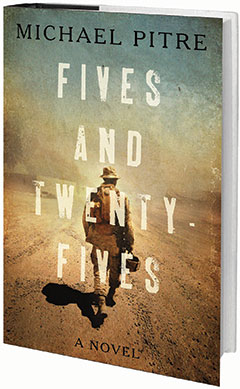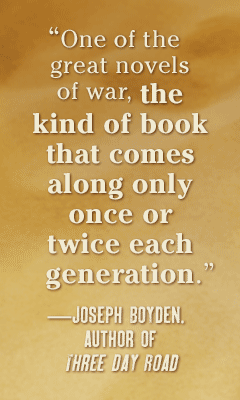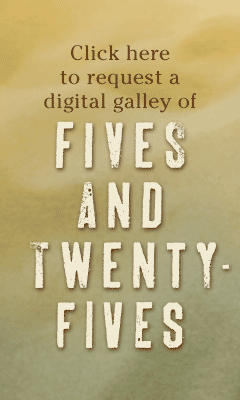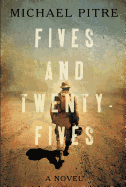Fives and Twenty-Fives
by Michael Pitre
When a road repair convoy stops to check for roadside bombs, their first duty is to scan five meters in all directions from within the vehicle. A bomb inside this perimeter can penetrate the vehicle's armor and kill everyone inside. Once five meters are cleared, scouts step outside and sweep an area 25 yards in every direction, before the convoy can move forward. These are the defining dimensions of a road repair platoon's daily work. Filling potholes in Iraq means clearing bombs.
Michael Pitre's debut novel, Fives and Twenty-Fives, follows three men from a road repair platoon in Iraq through their lives after their service has ended, alternating among their first-person voices. In disjointed chronology, the story switches between the present, when each man has either returned home or tried to create a new one, and their far more vivid past, in the Iraqi war zone.
Lieutenant Donovan is the platoon's leader, although he knows he relies overmuch on his highly competent sergeant and corporal. Both his rank and his natural reserve inhibit Donovan's relationships with the men and women assigned to him. "A real southern college boy, the Lieutenant. Like he was on his way to an outdoor jam band festival one day, took a wrong turn, and somehow ended up in the Marines." Corpsman Lester "Doc" Pleasant is from the wrong side of the tracks, but discovers a gift for medical work. The platoon's losses, which he is meant to prevent, hit him hard. Their "terp," or local-native interpreter, is a Baghdadi university student code-named Dodge ("a dependable car"), who carries a copy of The Adventures of Huckleberry Finn in his back pocket, filled with copious marginalia in both Arabic and English. He is assigned to Donovan's platoon but not allowed to talk with the Americans about his past--not that he wants to. In the aftermath of their war, the reader watches these three men try to navigate a world that no longer makes sense to them or of them.
In a post-Katrina New Orleans (and vomit-soaked French Quarter) as stark as the wartime Iraqi desert, Donovan goes back to school to pursue a business degree, but his professors don't feel that officer training should exempt him from coursework in "leadership dynamics and business ethics." He struggles to find relevance in school and work, and is haunted by the fates of the men and women of his platoon. Doc returns home to Houma, Louisiana, his military service having failed to offer the opportunity he sought. He can't stop worrying about his father working out in the shed late at night, and still carries his trauma bag everywhere he goes. Dodge is lost to his American friends, his postwar experience known only to the reader.
In flashbacks, the reader witnesses these men and others in their day-to-day work in Iraq: repairing potholes, each and every one of which reliably contains an IED; trying to keep the roads safe for military and civilian travel; balancing humanity against the ugly work of war; and riding out the senselessness of military politics. Relationships grow and fade. Their homes seem very far away, and are rarely mentioned. One exception is Donovan's phone call to his parents on his birthday, an effort that costs him dearly. Additional members of the platoon are revealed only in these flashbacks. The strong characters of Corporal Zahn and uber-capable Sergeant Gomez, for example, don't get first-person treatment; the reader has to work a little harder to puzzle out the endings to their stories, with an increasing sense of foreboding.
Meanwhile, in the present-tense sections, Donovan struggles with the social interactions required by work, school and the possibility of dating. He is hailed as a military hero but holds himself responsible for a range of less salutary personal postwar outcomes. Doc is back at the oil-change place where he worked in high school, his society consisting of a father he can hardly speak to and two friends in a band in New Orleans. Dodge inhabits a precarious position in Tunisia, a society teetering at the brink of violent protests and social upheaval; his pleas to come to the United States have been denied.
These young people come home from a deeply traumatic foreign war to a society totally unprepared to understand them. When Doc ventures out with a girl to see the fireworks on New Year's Eve, he reacts badly to the sounds of explosions and lashes out, wanting to protect those around him; but his companions, who barely know him, judge him to be unstable. Donovan carefully avoids playing the part of the "stereotypical brooding vet." The experiences of Donovan, Doc and Dodge are heartwrenching in both theaters; it is Pitre's greatest feat that they remain viscerally real people, not black-and-white cut-outs. From the perspective of his characters, there are perhaps no heroes here.
The quiet pathos of war, its aftermath and the individuals affected by it, and the inability of a tone-deaf society to relate to them, is rendered with poignancy and stark honesty in Fives and Twenty-Fives. Readers will be floored by Pitre's spare literary style, the authenticity of each of his characters' three different voices, and those mesmerizing characters themselves, who are not perfect but demand our compassion for their very reality. The story of Fives and Twenty-Fives is sometimes difficult to abide, but is also necessary; we are lucky to have such a fine voice as Pitre's to tell it. --Julia Jenkins








.jpeg) Michael Pitre is a graduate of Louisiana State University, where he was a double major in history and creative writing. In 2002, he joined the U.S. Marine Corps. He deployed twice to Iraq and attained the rank of captain before leaving the service in 2010 to get his M.B.A. at Loyola University. Pitre lives in New Orleans with his wife. Fives and Twenty-Fives is his first novel.
Michael Pitre is a graduate of Louisiana State University, where he was a double major in history and creative writing. In 2002, he joined the U.S. Marine Corps. He deployed twice to Iraq and attained the rank of captain before leaving the service in 2010 to get his M.B.A. at Loyola University. Pitre lives in New Orleans with his wife. Fives and Twenty-Fives is his first novel.